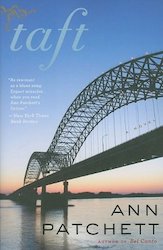
I came across my first Ann Patchett novel in the early 2000s–her fourth and possibly most popular novel, Bel Canto. Since then I have sporadically read some of her more recent novels, but I had never read her earliest works.
This fall, when Hurricane Irma was threatening south Florida and the school where I was teaching closed for the week, I drove north to ride the storm out in Nashville. That just happens to be where Ann Patchett’s independent bookstore, Parnassus Books, is. I had never visited, so it was a good opportunity. It’s a wonderful store and almost enough of a reason to move to Nashville. If I lived there, I’d be there every week. I picked up signed editions of her first three novels and one other I had missed over the years, and so I’ve decided to read through all of her works again and fill in those gaps.
I screwed up the order, however, and started with Taft, which is actually her second novel (1994). It’s the story of a former blues drummer, Joe Nickel, who now manages a well-known Memphis blues bar on Beale Street, Muddy’s. Joe works too many hours because his nine-year-old son, Franklin, has moved to Miami with his mother. Joe’s lonely for him and his “fatherhood” is very much the focus of the novel.
When Fay Taft and her brother Carl show up in his bar, and enter his life, he emotionally adopts them, but it becomes a very intricate and confused emotional tangle. Along the way, Joe learns that Taft, their father, has recently died, and Joe spends a lot of time trying to imagine what their lives were like together in the small east Tennessee town where they lived before arriving recently in Memphis.
While I don’t believe this is Patchett’s finest novel, I’m still taken with her prose and the way she lays out emotional family dramas. She blends humor, pathos, and enough suspense that Taft is ultimately a quick read and already demonstrates the terrific style for which she’s become known throughout her career. (I also happen to adore her nonfiction.)
So if you’ve read Bel Canto, or more recently, Commonwealth, consider her earlier novels as well. I’m looking forward to reading the other three very soon.
This fall, when Hurricane Irma was threatening south Florida and the school where I was teaching closed for the week, I drove north to ride the storm out in Nashville. That just happens to be where Ann Patchett’s independent bookstore, Parnassus Books, is. I had never visited, so it was a good opportunity. It’s a wonderful store and almost enough of a reason to move to Nashville. If I lived there, I’d be there every week. I picked up signed editions of her first three novels and one other I had missed over the years, and so I’ve decided to read through all of her works again and fill in those gaps.
I screwed up the order, however, and started with Taft, which is actually her second novel (1994). It’s the story of a former blues drummer, Joe Nickel, who now manages a well-known Memphis blues bar on Beale Street, Muddy’s. Joe works too many hours because his nine-year-old son, Franklin, has moved to Miami with his mother. Joe’s lonely for him and his “fatherhood” is very much the focus of the novel.
When Fay Taft and her brother Carl show up in his bar, and enter his life, he emotionally adopts them, but it becomes a very intricate and confused emotional tangle. Along the way, Joe learns that Taft, their father, has recently died, and Joe spends a lot of time trying to imagine what their lives were like together in the small east Tennessee town where they lived before arriving recently in Memphis.
While I don’t believe this is Patchett’s finest novel, I’m still taken with her prose and the way she lays out emotional family dramas. She blends humor, pathos, and enough suspense that Taft is ultimately a quick read and already demonstrates the terrific style for which she’s become known throughout her career. (I also happen to adore her nonfiction.)
So if you’ve read Bel Canto, or more recently, Commonwealth, consider her earlier novels as well. I’m looking forward to reading the other three very soon.
 RSS Feed
RSS Feed
